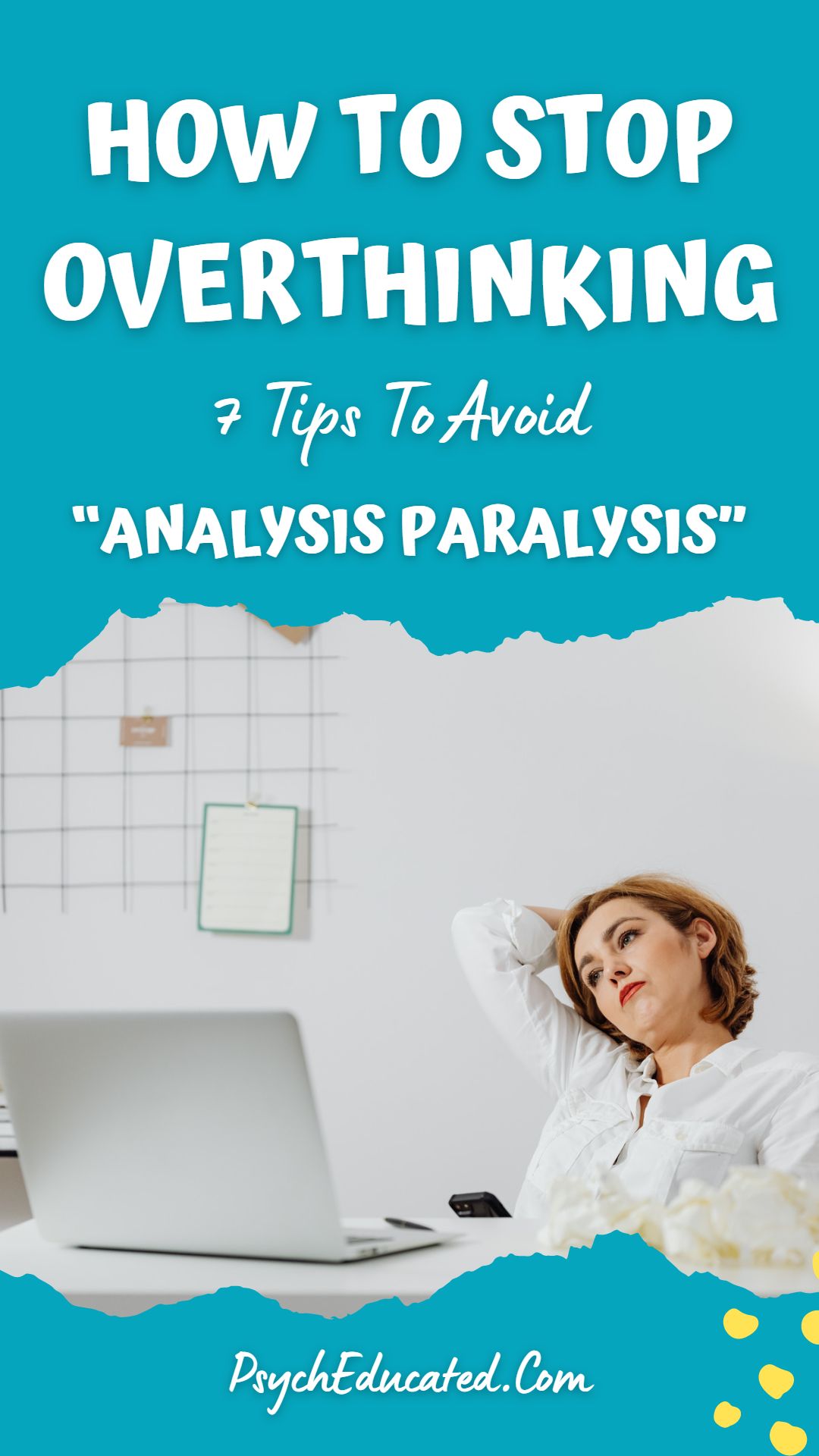Find us on:
How To Stop Overthinking: 7 Tips To Avoid “Analysis Paralysis”

It’s totally normal to worry about forthcoming events that are important or unfamiliar. It’s how the brain prepares itself for all the possibilities that can occur in a new situation.
For instance, before a big presentation, before starting a new job, while making a crucial decision, etc., a million thoughts can cross your mind.
What if I choke during my presentation? Should I visit my new employer to talk? What if I make the wrong decision? and so on and so forth.
I’m sure we’ve all experienced something similar.
However, when overthinking starts causing stress and anxiety, which in turn can lead to physical symptoms like headaches, stomachaches, and insomnia, or when overthinking decisions leaves you paralyzed and unable to make any decisions at all, you must find a way to control what goes through your mind and stop the overthinking habit.
But where do we draw the line between what’s normal and what’s not, and when can we say that we are overthinking?
How can we define overthinking
Overthinking is exactly what the name suggests. It’s when we think about a subject excessively.
Overthinking is going over the most obvious decisions over and over again. It’s also when we overanalyze events and circumstances until all sense of context is lost.
The mind of an overthinker doesn’t rest; it’s constantly ruminating and reflecting on past events—how bad they were, what they could have done differently—or thinking about future situations, and making bad predictions.
No need to mention that overthinking is bad for you. In fact, research has shown that overthinking increases stress levels, reduces energy, inhibits creativity, clouds your judgment, and deprives you of the ability to make decisions.
However, we must distinguish between worrying like ordinary adults and harmful overthinking.
For example, having different responsibilities regarding our families and jobs can make us go through the details of certain circumstances multiple times because, as responsible grown-ups, we want the best for our loved ones and our careers.
However, people who struggle with overthinking get excessively absorbed in analyzing a particular problem. They may get overwhelmed and paralyzed by their concerns and find it difficult to decide or take action, leading to “analysis paralysis.”
How does overthinking lead to analysis paralysis?
Analysis paralysis occurs when we overthink a situation and analyze every aspect of it to the point where we’re too overwhelmed to reach a rational conclusion or take any decision at all.
Whether it’s an important decision like quitting your job and accepting a new offer or a minor one like choosing a flavor at the ice cream shop, making decisions as an overthinker can be a daunting task marked by indecision and procrastination,
The more of an overthinker a person is, the more they become stuck and paralyzed when making decisions.
Anxiety contributes significantly to the vicious cycle of overthinking and analysis paralysis.
For example, when we have to make a decision, the anxiety, and fear of making the wrong decision make us think about the situation a little more.
But the problem is that the more we think, the more we’re anxious, and the more we’re anxious, the more we struggle to make a decision. And that’s when we get stuck in that loop, paralyzed and unable to take action.
What are the signs of overthinking
So, how do you know you’re overthinking?
Here are some of the most common signs and symptoms of overthinking:
- Fixating on your past mistakes and feeling like you’re stuck in a cycle of negative thinking
- Becoming overwhelmed or confused by the task at hand
- Avoiding or delaying decisions because you’re worried about the outcome
- Second-guessing decisions you’ve made
- Repeating the same thoughts or behaviors over and over again
- Thinking about the problem more than you’re thinking about the solution
- Becoming obsessive or compulsively checking your email, text messages, or social media
- Imagining the worst-case scenario or outcome
What are the causes of overthinking
Why do we fall into the overthinking trap?
For example, when we have to make a certain decision, we assume that if we think hard enough we’ll have more clarity, whereas thinking only leads to more thinking.
Some of the reasons that lead to overthinking are:
- The strive for perfection
- Anxiety, stress, and worry.
- Getting fixated and entangled in the details prevents us from seeing the big picture, leading to paralysis and a lack of progress.
How to stop overthinking and avoid analysis paralysis
Overthinking not only causes stress, anxiety, negative thoughts, headaches, insomnia, and many more health and mental problems, but it can also lead to analysis paralysis, which consumes our energy and prevents us from moving forward in our lives.
To stop overthinking and avoid analysis paralysis, try the following tips.
1. Notice and recognize overthinking
Try to be more aware of your thoughts.
You can start changing your thinking patterns once you become aware of them.
Whenever you find yourself trapped in your own head, ask yourself, “Am I really concerned about that particular thing?” “Or am I simply overthinking something that may or may not occur?”
You can also write down the negative thought, question it, challenge it, and replace it with a more positive one.
2. Have fewer options
The other day I needed a new dress for an upcoming event, so I went to this new clothing store that had opened close to where I live. Once I got there, I saw the items displayed in the store window. Wow! “I’m definitely going to buy something from here,” I said to myself.
So I walked in and found this massive floor with every possible option displayed. Various brands, materials, and colors; long, short, expensive, and less expensive. Everything! I must have liked a dozen of them. It was very overwhelming. So I decided to do some more exploring on the other floors. And after doing that, I just left the store without buying anything.
Next, I went to a smaller store, one that I’d already bought several items from. There were a few options in that store—not too many, just enough—and right away a beautiful dress caught my eye. I chose the color that I liked, and voila! I was happy with my choice.
The moral of the story is that the more options you have, the more you overthink, and the more you get overwhelmed, indecisive, and paralyzed.
So the best thing to do is to minimize your options when you can.
Also, try doing an elimination process right away when you have many options because as we said the fewer the better.
3. Make fast decisions
Don’t give yourself time to think; just make that decision as quickly as possible. I know. Just thinking about it can be frightening. But you know what that overthinking brain does! The moment you start thinking, you’re stuck in there.
What you need to do is trust your instincts and believe that your subconscious mind has more data than you realize.
You can experiment with impulsivity. For example, when you go to the grocery store, just grab that pasta! Take the first cereal that you like! Don’t think about it.
Try doing this with all the small decisions of your daily life. This will help you gain more confidence with bigger decisions.
4. Work on your self-confidence
If some of your previous decisions did not turn out well, you may begin to lose self-confidence and doubt every new decision that you have to make.
Try to block the negative thoughts and focus on what you have learned from your past mistakes.
Here are some quick tips to help you be more confident and more assertive:
- List your strengths and positive qualities.
- Make peace with your previous mistakes.
- Practice positive self-talk.
- Celebrate your wins and achievements.
5. Set a deadline
The more time you give yourself to consider a decision, the more likely you are to overthink it and fall into analysis paralysis.
So, what you need to do instead when it’s time for decision-making is to set yourself a deadline. The bigger the decision the more time you’re going to give it.
When your time is up, that decision must be made, no matter how unsatisfying it may seem. Use the time to go logically through your options to find the best one. However, don’t be afraid to trust your intuition to help you reach your final decision.
6. Focus on what you can control
When you find yourself overthinking, take a step back, examine the situation and try to shift your attention to the things in your control. What’s in YOUR power? What can YOU do to stop or fix the problem? Then act immediately to avoid analysis paralysis.
7. Prioritize self-care
Analysis paralysis, or the inability to decide, happens when you keep pressuring yourself to analyze all the possibilities when you’re already tired and overwhelmed.
Don’t fall into self-destructive behavior. Instead, incorporate self-care habits into your daily routine. Take as much rest as needed, relax, de-stress, and always take care of yourself.
Prioritizing self-care will help you improve your mood, your confidence, and your overall well-being, which can in turn help reduce overthinking.
Some self-care activities include:
- Exercise
- Mindfulness and meditation
- Getting enough sleep
- Eating healthy
- Pursuing hobbies
- Spending time with loved ones
- Taking breaks and relaxing.
Conclusion
Overthinking can be a serious problem for some of us. If it persists for an extended period of time, it can easily lead to physical and mental health problems if not addressed.
In order to stop overthinking and avoid analysis paralysis, you need to practice, practice, and then practice some more. Overthinking is a bad habit that can be removed and replaced. It has to be recognized and dealt with.
Try the tips mentioned above and implement them in your everyday life. With time and effort, you’re going to be able to stop overthinking and go on with your life with a more assertive attitude, ultimately avoiding analysis paralysis.
If you feel that it’s too hard for you to go through it alone, it’s okay. You should seek help from a healthcare professional.
Related article [How To Block Negative Thoughts: 9 Easy Tips]
Pin me!

Do you struggle with overthinking? Did you experience analysis paralysis before? How do you break free from it? Share your story in the comments section!




